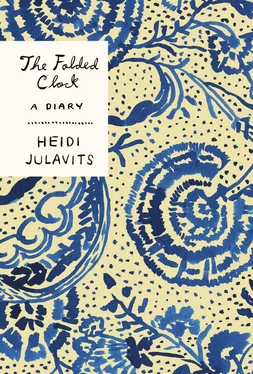Today I went to a neighboring town to see the gallery opening of the woman inundated by motherhood and to hear another woman read. This town is as close to fancy as Maine can muster. It is also very literary. The poet Robert Lowell used to live in this town, ergo his second wife, Elizabeth Hardwick, lived in this town, and so did Jean Stafford, his first. Jean Stafford wrote a short story published in 1978 called “An Influx of Poets,” about the inundation of poet guests to her summerhouse, and the subsequent ruin of her marriage.
Cora’s marriage to the poet Theron Maybank dissolved after five years in an awful Maine summer, right after the war. Every poet in America, it seemed, came to visit. They sat around reading their own works aloud, not listening to each other .
I will never write a story called “An Influx of Fiction Writers,” even though there are many fiction writers in my town. More come every year, but we don’t sit around reading aloud our stories to each other. Mostly we talk about old barns and how to keep them from falling down. Maybe this is our coded way of discussing how to prevent, given our dangerous summer numbers, the future dissolution of our marriages.
This fancy town is also a famed warfare site, and not only of the domestic variety. I’ve been told the history of this town. A Revolutionary War — era something happened there. The battle of something. During the war, people floated their houses here on boats from (or maybe to) Quebec. Or from (or maybe to) Massachusetts. They were either too sentimental to leave their houses where they’d built them, or they were too cheap to build new ones. When I think of this town, the image that comes to mind is a harbor clogged by floating houses, and people in tri-corner hats yelling at each other, “Watch your front porch, asshole!”
Subsequently, or not, the town consists of mainly colonial-era houses, and all of these houses are white because of a town ordinance. There is no town ordinance, however, governing public drunkenness or bad art. Most galleries sell the art of the vacation spot. Postcard-equivalent landscape paintings. Sculptures so figurative they appear Duchampian. A “Tea Cup” or a tea cup?
The art was not bad at the gallery we visited. My friend’s art is there, and she is a really good artist. She makes bleak and lonely paintings that I can’t help but unimaginatively view as representations of her maternal experience.
The energy on Main Street was scatty. There had been “feeder races” that day. Sailors had been fed into a boat on the other side of the bay and ended up here. Not much feeding occurred on board, but lots of drinking had. Some of these sailors landed at the gallery where there was more wine, and also chalk for the children. The drunkest sailors drew on the sidewalk with the children’s chalk.
But I was also in town for the fiction reading. The reading was held in the white Parish House on the town green. The writer was Jewish. Her stories were about Jews in New York. She said the word “Shabbat” a lot. Behind her podium hung a portrait of a man from the 1700s. The parson, maybe? He stared disapprovingly at the woman throughout her reading. Who on earth was this New York Jew reading her fiction aloud in the parsonage? Wasn’t there a town ordinance governing this?
Afterward, a handful of us went to dinner at a Victorian inn. We were greeted by a woman who resembled a governess. More portraits stared at us throughout dinner. I did not know most of the people at the table, and so I found myself explaining myself a lot. One woman asked me where I spent my summers. I told her the name of my town. “Ah,” she said. “And is yours a heritage family ?” I had no idea, I told her — I had never heard this term before — but I guessed not. If she’d known my last name she’d never have asked me. Julavits is not heritage for anything you’d want to boast a historical connection to in these WASPy parts. Though maybe she did know my last name, and this was her indirect way of asking: Are you Jewish? I was indirectly asked this question a lot as a kid. After the Christmas vacation, kids would ask me, “How was your holiday ?” In middle school, a Jewish family moved into the house next door. They noticed our lack of a Christmas tree (we’d gone out of town to visit my grandparents who’d retired to Florida). We were understood to be Jewish by these neighbors, and my mother never had the heart to correct them, not even when they invited us to Jewish holiday dinners. There seemed no way to set them straight without lots of awkwardness or risking offense. ( You? I look nothing like you .) At a certain point, it seems more polite to just become the person people assume you to be.
Today I went to a dinner party at Edith Wharton’s house. I wish this were as it sounds —Edith Wharton invited me for dinner! — but it wasn’t. Edith Wharton was dead this evening. She was seventy-five years dead. Instead I’d been invited by a Wharton scholar to celebrate the 150th anniversary of Wharton’s birth. For sure I should have been up on my Whartonalia. I should have improved my knowledge of her life beyond “she had a crappy first marriage just like I did!” Fortunately, at dinner, I sat next to two kids, and instead of talking about Wharton we talked about our fears of bears and sharks. Because I am considering a long-distance ocean swim next summer, I was coming to know a lot about sharks. I knew, because an all-but-dissertation philosopher had told me, that since 1582 there have been only 133 reported human deaths caused by a shark. This did not make the kids, nor did it make me, less convinced that we’d be killed by one.
Then I chatted with the director of The Mount (this is the name of Wharton’s house), and she had shark fatality — type numbers at her fingertips about Wharton, and she seemed mildly appalled I should know so little about the house to which I’d been invited, other than that Wharton had lived in it. Finally I escaped. I found a writer I’ve always thought to be very beautiful and affixed myself to her. This writer has a serene face, and no other writer I know is serene at all. Especially their faces are not serene. Because of her face, I remember very clearly the first time I saw this woman. This was, give or take, late 1997 or early 1998. I was waitressing at a restaurant owned by a former actress who required me to French-braid my hair. One night this writer came in for dinner. Everyone glowed in this restaurant — the lighting was incredibly flattering, and the customers always looked marriageable, which was probably why a good many of them came here to become engaged — but she glowed differently. Beatific, I suppose, is the word for her type of glow. Her glow was the glow of her spirit or her soul or something that went deeper than skin and diet and lighting.
At the time I hadn’t published anything. I was too inhibited to introduce myself to people who I thought would have no interest in knowing me. I could give them a reason to talk to me by saying, I am just such a huge fan of your work , but that’s brownnosing where I come from, even if you truly mean the compliment. For this reason I didn’t introduce myself to Joan Didion, whom I’d waited on, and I didn’t introduce myself to Bret Easton Ellis, whom I’d also waited on. I didn’t say to Didion, “I can quote lines from your work.” I didn’t say to Ellis, “I snorted honorific lines off your book jacket.” I said to Didion and to Ellis, “Would you like to see the dessert menu?”
I also didn’t introduce myself to this beatific woman. I’d read her work in magazines. She counted as a star sighting for me. And she glowed, she was really so glowy. She was glow atop of glow. I remembered her so vividly I half doubted, now that I was seeing her again, that this encounter had happened at all. I have come to that point in my life where my memories have begun interbreeding. I’d seen her, somewhere, true, but maybe not at that restaurant, and the glowy nimbus surrounding her, maybe that was just more postproduction touch-up.
Читать дальше












